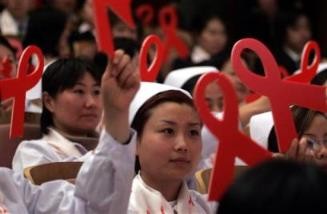Health authorities announced on Tuesday, Nov. 24, that they have recorded 38,283 HIV carriers and AIDS patients in northwest China's Xinjiang Uyghur Autonomous Region in October, the Xinhua News Agency reported.
Issuing the statement ahead of World AIDS Day on Dec. 1, the region's health and family planning commission stated that sexual transmission account for more than 62 percent of the cases, which had become the main factor for the AIDS prevalence in Xinjiang, while over 28 percent of HIV-infection cases were attributed to intravenous drug use.
According to the report, Xinjiang has been plagued by serious drug problems for decades as the region lies on a trade route for illicit drugs in the so-called "Golden Crescent" area of Pakistan and Afghanistan. The increase in HIV/AIDS cases has been previously blamed on the rampant needle-sharing among drug users.
The central and regional governments have poured in more than 1 billion yuan (around $156 million) of funds over the last five years for better HIV/AIDS prevention and treatment in Xinjiang.
Ni Mingjian, an HIV/AIDS expert with the center for disease control and prevention in Xinjiang, said that the government has set up a total of 91 designated hospitals in the region, which provide anti-virus treatment, and 485 voluntary HIV counselling and test stations.
As of the end of October, more than five million people have been screened in Xinjiang's 306 HIV/AIDS screening labs, nearly 20 percent of the region's total population, Ni said.
The Xinjiang government has also implemented measures to ensure that HIV-positive patients will have access to equal employment, medical treatment and an improved quality of life.
Official data showed that the number of people living with HIV/AIDS in China by the end of Oct. 2014 has reached 497,000, with 154,000 related deaths.



























